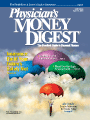Publication
Article
Know All Your Estate Planning Benefits
Author(s):
It's important to have an updated estateplan. If you're single, your estate planprovides for the orderly transfer of yourassets to those people or organizationsyou designate. If you're married and havechildren, the issues will usually be morecomplex, but the benefits of planning willalso be more profound.
PLANNING FOR THE FUTURE
Of course, creating an estate planrequires thinking ahead. You will want tomake certain that your surviving familyhas immediate access to cash to coverongoing living expenses while your estateis being settled. While it may be hard toimagine that this would be a problem, itis not unusual for the courts to "freeze"assets for weeks or even months whiletrying to determine the proper dispositionof the estate. Additionally, if yourspouse lacks financial knowledge or experience,your estate plan should providefor assistance with financial management(eg, setting up trusts).
In your estate plan, you may also wantto address issues regarding funding foryour children's education. If you haveyoung children, you may want your survivingspouse to have the option of not workingso that they can devote more attentionto your children. Raising children in a1-parent household can be quite a challenge.Often, life insurance is an excellentsolution for securing the exorbitant costsof education for children.
Also, your estate plan should considerthe consequences of both you and yourspouse dying simultaneously. If you haveminor children, you will want to selectsomeone to manage your assets for theirbenefit. You do not want to have thecourt make this decision for you. In thissituation, your estate plan should alsoaddress when your child will receive yourassets free of trust.
More important than the financialissues, is the issue of who will raise yourchildren if you and your spouse die prematurely.Give very careful thought toyour choice of a legal guardian. Keep inmind their age and financial condition.Some guardians may lack the child-rearingskills you consider necessary. Make surethat your plan does not create an additionalfinancial burden on the guardian.
COVERING ALL CONCERNS
During your lifetime and at your death,your estate plan should focus on how bestto reduce taxes and expenses. During yourlife, there are primarily income tax issues.At death, there are also potential estatetax issues and administrative fees as wellas other expenses to consider. Plan welland you can minimize costs, resulting inmore money passing to your family.
Your estate plan can also be used toprovide assistance and guidance to membersof your extended family. Considercarefully, for example, if you may need toprovide financial support for a parent, sibling,niece, or nephew. If the answer is"yes" or "maybe," there may be solutionsthat also provide tax benefits to you.
Do you have a favorite cause, charity,or religious organization? You can useyour estate plan to provide assistanceeither during your lifetime or at yourdeath. This is one of the instances inwhich our government actually providesyou with incentives to do so.
The ultimate benefit of a well-craftedestate plan is that it provides you with acompass for managing your finances. Itwill lessen not only your own stress, butthat of your loved ones as well. It is theappropriate thing for you to do and isworth the time, effort, and expense. Tofind a professional advisor who works inthe estate planning area, go to www.naepc.org and click on "find an accreditedestate planner."
Stewart H. Welch III, founder ofthe Welch Group, has beenrated one of the nation's topfinancial advisors by Money,Worth, and Medical Economics.He welcomes questions orcomments from readers at 800-709-7100 orwww.welchgroup.com. Reprinted with permissionfrom the Birmingham Post Herald.This article was taken, in part, from J.K.Lasser's New Rules for Estate and Tax Planning(John Wiley & Sons; 2001), coauthored byHarold Apolinsky, Esq, and Mr.Welch.
